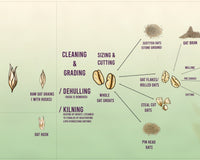The team of scientists from King's College in London encourages parents to give their kids some peanut butter until they reach the age of five.
According to their research giving smooth peanut butter to babies and throughout early childhood, could provide them with lifelong protection against peanut allergy. Teenagers who had it until they were 5 were 71% less likely to develop an allergy than children who never ate peanut butter.
Food allergies result from our immune system mistaking something harmless for a severe threat. Kids' early life is a critical period for the immune system to learn to recognise foods and which ingredients are good for them.
The researchers advise parents to give smooth peanut butter during infancy and then regularly until age five. The tiny babies should not
not eat crunchy peanut butter or whole peanuts due to the risk of choking.
Some parents might be surprised by the latest results. In the past, it was common to avoid peanut butter and peanuts due to the fear of allergies, especially for children under the age of three.
In recent years, peanut allergies have become more common, and currently are affecting one-in-50 children. This led to the banning of all kinds of peanut products at schools. As even a small amount of peanut can cause a life-threatening reaction in somebody with an allergy.
The latest findings show the previous advice was wrong.
The results are based on a 15-year-old clinical trial in which 640 children at high-risk of peanut allergy took part. Half of them avoided peanuts and the other half had it as part of their diet between four-months-old and five-years-old.
The results published in NEJM show that eating peanut butter dramatically reduced allergies by the time children celebrated their fifth birthdays. The findings show that the protection lasted whether children continued eating peanuts or removed them from their diets.
Some 15 out of every 100 high-risk children that avoided peanut as an infant developed an allergy in their teenage years. Only four out of every 100 high-risk children that regularly ate peanut as an infant developed an allergy.
The results show a remarkable reduction in allergy of 71% and it didn't matter whether children kept eating peanut after the age of five.
Prof Gideon Lack, from King's College London, commented for the BBC: "I'm delighted to see this protection continues into adolescence."
"We have good reason to believe [it will last] for the life of the individual, it is extremely unusual to see new onset of peanut allergy in adolescent years.
"This simple intervention will make a remarkable difference to future generations and see peanut allergies plummet."






